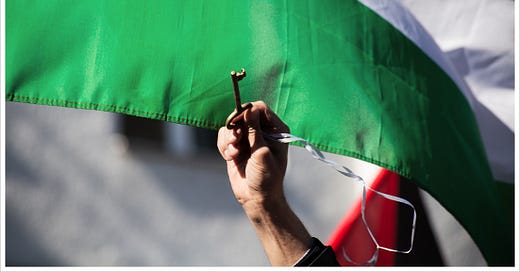Memorialisation of the 1948 Nakba is fiercely contested. Marked on May 15th of every year, the Nakba refers to ‘The Catastrophe’ in which over 500 Palestinian villages were destroyed and 58% of the Palestinian population expelled. 78% of historic Palestine was conquered and renamed Israel. Across historic Palestine, commemorating the Nakba often entails the risk of a bullet-riddled head or lungs clogged with tear gas.
This is because the object of every territorial conflict has been not only to expunge a people from the land but to erase all evidence of their existence there. This was a feature of the Balkan Wars of the 1990s, particularly Serb policies toward Bosnian villages in what they claimed as “Greater Serbia”. It is also typical of land ownership disputes across sub-Saharan Africa, from Kenya to Côte d’Ivoire to Ghana, where select ethnic groups seek to claim fertile land from “hordes” or “aliens” (who themselves have lived and worked there for decades or centuries) by rights of ancient ancestry or particular lineage.
This rhetorical ‘scorched earth’ tactic operates as follows. Firstly, the land is cleared of its occupants and the traces of their existence scrubbed from the soil. Secondly, the territory is “ethnically re-engineered” by installing settlers. Thirdly, the history is rewritten: a contemporary occupation is translated into an eternal or moral righthood. These sorts of “no history before our history” strategies were of course immensely useful to the European colonial projects of the 19th century – in particular, British justifications of Empire in India, or the settler-colonisation of the Commonwealth territories. It was out of such projects that Zionism was first born.
“The denial of the Nakba facilitates its continuation.”
People deny history because they have a vested interest in continuing to reap the benefits of its denial. See, for instance, Republican state legislatures pushing Black histories of marginalisation to the peripheries of their curricula. History is the candle by which we illuminate our existence. Its denial is the blanket with which others attempt to snuff it out.
Nakba denialism plays an awkward, and ultimately unsuccessful, role in this game. It says: this history is false, but if you keep reciting it we shall repeat it. That is, it captures the duplicity of oppressing a people into denying their own existence, of claiming a people do not exist while pushing them out of that existence. Scores of activists, including Israeli human rights organisations such as Breaking the Silence and B’TSelem; Israeli historians from Avi Shlaim to Ilan Pappe to Theodore Katz; and of course, Palestinians themselves, most visibly the renowned journalist Shireen Abu Akleh and over 100 journalists killed in Gaza since October 2023, are silenced in consequence. In this way, the denial of the Nakba facilitates its continuation. But how can the truth be bludgeoned out of a people who are forced daily to relive its torments and to suffer its consequences?
“Before I was rewritten by the coloniser as murderous militant or collateral corpse, I was here.”
When a Palestinian lifts the key to their home or shows you pictures of their village, they are telling you, “I was here”. Before I was rewritten by the coloniser as murderous militant or collateral corpse, I was here. What happened in Tantura and Deir Yassin in 1948 were not isolated events. They were part of a systematic policy of destruction and reinvention that continues today. When Palestinians tell you “This is when they began to extinguish us”, there is a plea in that fact. They are also telling you “They are still trying to extinguish us.” It is a plea for liberation. This is where we get to the crux of the issue: by denying this history, its actors are able to reject the obligations that accompany it and carry it to its desired conclusion.
To acknowledge the forced expulsion of over 750,000 Palestinians (and the massacre of over 15,000) from 1947-1949 is to acknowledge the continual expulsion and extermination of Palestinian life since then: the 7 million Palestinians living outside Palestine, primarily in refugee camps, lacking Haq al-Awda (the right of return), and the 7 million Palestinians living in various strains of unfreedom within it. In short, it is to acknowledge the inherent untenability of the Zionist project.
When Palestinians tell you about the systematic poisoning of village drinking wells, or babies carried in pillowcases over miles travelled by foot, they are telling you that the State of Israel was born of violence. Its heel first stood not upon barren desert but the Palestinian throat, and it has seldom lifted for one moment since. To tell the victim’s history is to hold up a mirror to its victors and implore them to look inside. We would be wise to do so before it is too late.




